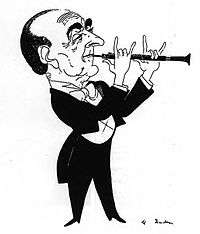Marcel Tabuteau

Marcel Tabuteau (2 July 1887 – 4 January 1966) was a French-American oboist who is considered the founder of the American school of oboe playing.
Life
Tabuteau was born in Compiègne, Oise, France, and given a post in the city's municipal wind band at age eleven. He then studied at the Conservatoire de Paris with the legendary oboist Georges Gillet.
Walter Damrosch brought Tabuteau, together with French musicians flutist Georges Barrère, bassoonist Auguste Mesnard, clarinetist Leon Leroy and Belgian trumpeter Adolphe Dubois to New York in 1905 to play in his New York Symphony Orchestra. Damrosch was fined by the musicians' union for not advertising for musicians from New York, but the emigrating musicians were allowed to stay.[1][2] In 1906 Tabuteau returned to France to complete his three years of compulsory military service as a French citizen, and served as a military musician in the regimental band of the 45th Infantry Regiment in Compiègne. A French law that had been enacted on July 11, 1892 gave special consideration to graduates of the Conservatoire, allowing him to be demobilized after just one year of service. He returned to the United States in 1907 and the union again tried to have him expelled, on the grounds that there had been a break in his US residence since filing his first citizenship papers. The union was unsuccessful and Tabuteau became a US citizen in 1912.
Tabuteau served as principal oboist of the Philadelphia Orchestra from 1915 to 1954 under the famous Leopold Stokowski and, just as importantly, taught in Philadelphia at the Curtis Institute of Music. There his classes included Oboe, Woodwind Ensemble, Orchestral Winds/Percussion Class, and String Classes. He taught at Curtis from its founding in 1924 until his retirement in 1953.

Legacy
Tabuteau's many notable oboe students included Rhadames Angelucci, Joseph Robinson, John de Lancie, Marc Lifschey, John Mack, Felix Kraus, John Minsker, William Criss, Daniel Stolper, Harold Gomberg, Ralph Gomberg, Robert Bloom, Alfred Genovese, Donald Baker, David Dutton, Wayne Rapier, Louis Rosenblatt, Laila Storch, and Laurence Thorstenberg. Storch some years afterward wrote: "During the thirty years during which Tabuteau taught at the Curtis Institute of Music, he came to exercise a decisive influence on the standards of oboe playing in the whole United States, as well as raising the level of woodwind achievement in general. Nor was the impact of his teaching confined to winds alone, as the many string players and pianists who attended his classes will testify."[3]
References
- ↑ [no author cited], Damrosch Fined $1,000; Didn't Consult Union, The New York Times, June 1, 1905.
- ↑ Shilkret, Nathaniel, ed. Shell, Niel and Barbara Shilkret, Nathaniel Shilkret: Sixty Years in the Music Business, Scarecrow Press, Lanham, Maryland, 2005, p. 27; see also caption to centerfold picture of Henri Leon Leroy. ISBN 0-8108-5128-8
- ↑ Marcel Tabuteau, profile written by Laila Storch and published by To the World's Oboists by the International Double Reed Society, Boulder, Colorado
External links
- Marcel Tabuteau, profile written by Laila Storch and published by To the World's Oboists by the International Double Reed Society, Boulder, Colorado
- A Little Garlic, an article about Marcel Tabuteau in Time Magazine, Nov. 20, 1939
- Quelques photos ! (in french)
- Marcel Tabuteau: How Do You Expect to Play the Oboe If You Can't Peel a Mushroom?